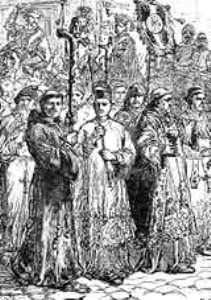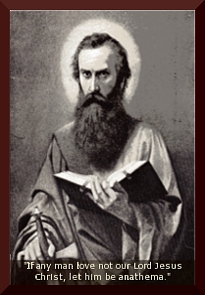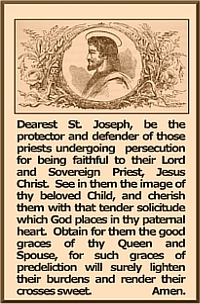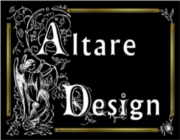 Friends of this blog will recall a comment submitted by Cestus Dei not too long ago. Well, I found that David Werling of Ars orandi wrote a response to the neo-conservative Mark Shea that is also perfectly suitable for the ‘ears’ of Cestus and any like her.
Friends of this blog will recall a comment submitted by Cestus Dei not too long ago. Well, I found that David Werling of Ars orandi wrote a response to the neo-conservative Mark Shea that is also perfectly suitable for the ‘ears’ of Cestus and any like her.
Recall that Cestus had said:
“This is a general post relating to this blog:
You know, based on what I’ve read on here you all are the ones who have a problem with the Church. You pick and choose what you want to believe; you’re the typos of “cafeteria Catholic.” In the end you give a bad name to those who have an appreciation of the Tridentine Mass (and you also give a bad name to home-schoolers). It seems that whether it is in regard to music, or whatever else, you are the divisive one. You and your comrades in arms are dangerously close to schism it appears. It is sad to think that now you feel vindicated by the widespread celebration of the 1962 Missal as directed by Pope Benedict. I fear he isn’t aware that he gives your types ammunition.
You might want to go back to the drawing board and reconsider your approach. You take this statement from a Pope which doesn’t bear any doctrinal weight nor any magisterial authority and you elevate it to just that. However, when it regards Vatican II you demote the conciliar teachings to being something optional. You need to do a lot of praying and try to avoid becoming the Protestants you abhor.”
Taking the liberty of addressing Cestus’ charges with the words of Mr. Werling – he expresses it so much better than I could, and most charitably – I post what he wrote (slightly shortened) to Shea:
———————————————————————————————————————————
Mark Shea publicly replied to my comment with the following:
I am a Traditional Catholic. I believe everything the Church teaches. Or, oh! Wait! By “Tradiitional” do you mean a “real* Catholic as in “my particular subculture”? See, that’s the thing. I don’t believe in reducing the Church to one particular subculture within the Church.
Well, first, Shea’s definition of a traditional Catholic as someone who believes everything the Church teaches is so nebulous that it fails to adequately identify a Catholic in general, let alone a traditional Catholic in particular.
Obviously, a person can believe everything the Church teaches without actually being a Catholic. There have been, as we are finding out everyday, numerous members of the Anglican Communion who believe everything the Catholic Church teaches (or so we have been assured, at least). In addition, I’m sure that there could be more than one or two Lutherans running around who might just happen to believe everything the Catholic Church teaches. Obviously, we hope that most, if not all, catechumens come to believe everything the Church teaches before they enter into communion with the Catholic Church.
Shea’s definition lacks specificity in regards to Catholics in general mainly because it leaves out two very important elements, i.e. Baptism and visible communion with the institutional Church. Thus, since it fails to adequately define a Catholic in general, it certainly can’t be an adequate definition for a particular sort of Catholic such as a traditional Catholic (or Byzantine Catholic, or Chaldean Catholic, etc.).
A traditional Catholic, as it is understood nearly everywhere in the sane world, is best defined as a Roman Catholic who is particularly attached to the Traditional Latin Mass, now known as the Extraordinary Form of the Roman Rite, and its commensurate spirituality. Granted, other well educated and smart people may define it a bit differently or may attach one or two caveats, but for general purposes this definition is specific enough to be meaningful, but general enough to allow a wide variety of positions and opinions regarding various matters, some more important than others.
Given this definition, Mark Shea is definitely no traditional Catholic. But why is it so important for him to identify himself as such? What is he trying to say? I think the tone of the rest of his reply gives us part of the answer. What Shea means to say is that every Catholic is naturally a traditional Catholic, and real traditional Catholics, like you and I, have no right to the title, and, I would imagine, he thinks that we don’t have any right to exist either. You see? if he thought we did, he would have said something like: “No, all Catholics are naturally traditional Catholics; what you are is called a [fill in the blank] Catholic.” Shea doesn’t offer this correction, which ought to lead us to think the obvious.
At any rate, the question to ask Mark is this: If I were a Byzantine Catholic, and I said something like, “gee I wish you were a Byzantine—I’m going to pray that you come over to the East”, would Mark Shea respond with this comment? Would he have accused me of trying to reduce the entire Church into the Byzantine “subculture”? No, he wouldn’t—at least, I don’t think he would. Why? Because, simply, he doesn’t harbor a disdain for Byzantine Catholics that he does for traditional Catholics. There’s a deeper psychology at work that has rendered Shea’s rhetoric illogical.
This brings us to the second part of Shea’s comment. Shea accuses me of saying that only traditional Catholics are “real” Catholics, and of reducing the Church to “my subculture”, as though “my subculture” was something to be loathed. He makes this conjecture with an unmatched malevolence that is common to Mark Shea’s callous rhetorical bravura, and, I have to admit, I do enjoyed this bravura when it is directed at the enemies of Holy Mother Church. So if I had made such a claim, then his malevolent bravura is perhaps justified.
The problem is, I haven’t and I wouldn’t. Nowhere on this blog, or in anything I’ve written for The Remnant Newspaper, or on the Facebook fan page, have I ever made the claim that only traditional Catholics are “real” Catholics.
So where did Mark Shea get this idea? I suppose he could have heard it from any number of evil traditionalists, the likes of which everyone knows are found under every TLM stone! You know the kind? The trad that thinks everyone is going to hell except himself. They are everywhere! But, if you, like me, actually know many traditional Catholics, you will know that these evil trads are, well, as rarely found in our circle as they are in the mainstream, novus ordo crowd. No, I think there is probably another cause for Shea’s fancy.
Let’s go a little deeper into the psychology of Shea’s comment. Why the word “real”? Of all the criticisms of the traditional Catholic community, Shea chooses to accuse me and all other traditional Catholics of thinking we are the only “real Catholics”. I’m no Freud (thank God!) but if I had to take a clinical stab at what is really eating Mark Shea, I would have to say it is insecurity.
And why not? Mark Shea is a smart guy. He knows Catholicism, and thus he has to know that the Mass of the traditional Catholic communities was the Mass of the vast majority of the saints in the Western Church; he knows that the Traditional Latin Mass, as codified after the Council of Trent, is the Roman liturgy that dates back to the time of Pope St. Gregory the Great, and contains the most ancient of liturgical formulas in the Roman Church. It’s just a plain, simple, historical fact that the Traditional Latin Mass shaped the Roman Catholic Church, and Mark Shea is too smart to deny it. And this is what is most important for understanding the psychology of Mark Shea’s comment: he has already expressed, in a rather tactless fashion, his disdain for this ancient liturgy that defined the Church he loves!
Allow this to resonate. He disdains the liturgy, which, he cannot objectively deny, has shaped the Church he loves. That’s quite a conundrum! He can be likened, in a way, to a person who hates his parents. Imagine the angst!
At one time Shea could take some consolation, along with Pete Vere and Patrick Madrid, in the “fact” that the Mass prior to the novus ordo had been abrogated (as they contended in the book More Catholic Than the Pope). The argument runs as follows: the promulgation of the novus ordo abrogated the Traditional Latin Mass; thus the novus ordo, as a development of the Traditional Latin Mass, is, in fact, the same Mass. Traditional Latin Mass became the novus ordo, so the novus ordo = the Traditional Latin Mass. It follows from this that to ask for the Traditional Latin Mass was superfluous because the novus ordo was the traditional Mass. It also follows that novus ordo conservatives (and only conservatives because the liberals weren’t invited to Pete and Patrick’s party) were traditional Catholics, and all those who were attached to the abrogated Mass were disobedient and disaffected at best, or schismatic at worse. This is where Shea gets his claim that he is a “traditional Catholic”, because traditional Catholics, real traditional Catholics, attend the novus ordo!
Not surprisingly the traditionalist critics pounced on this laughably unsound logic. Really, the book was a flop. Everyone I know who read it, traditionalist or not, were left confused by the book’s rhetoric and strange logic. However, that is now all completely beside the point.
It is now beside the point because Vere and Madrid’s argument has fallen on the wrong side of history. The traditionalist critics of Vere and Madrid were correct! As it turns out, Pope Benedict XVI, in the motu propio, Summorum Pontificum, declared, in agreement with the traditionalists, that the liturgical books of 1962 had never been abrogated when the novus ordo was promulgated! What’s more, traditional Catholics had a right to the old Mass! However, to my knowledge Vere and Madrid didn’t even bother to correct their book, which still contains these errors along with a few other doozies. Nor were apologies forthcoming when the excommunications of the bishops of the Priestly Fraternity of St. Pius X were lifted by the Holy Father. Now that prominent churchmen and theologians are taking seriously the traditionalist critique of the 20th century changes in the Church, as first formulated by thinkers such as Romano Amerio, it is becoming crystal clear that a place is being carved out for traditional Catholics in an emerging Church, just now starting on a reform in continuity with Tradition of the post-Vatican II errors. That place had been denied to traditional Catholics, not just by the liberals of the “hermeneutic of rupture”, but also by the mainstream, novus ordo conservatives such as Vere, Madrid, and, our friend, Mr. Mark Shea.
So the present situation that these novus ordo conservatives find themselves in after Summorum Pontificum is a rather uncomfortable one. They were so sure that the old liturgical books had been abrogated. Wrong! They were so sure that the novus ordo was the Traditional Latin Mass for the very reason that the old books had been abrogated. Wrong again! Because the old liturgical books were not abrogated, and because there are now two forms of the Roman Rite, the novus ordo is certainly distinct from the Traditional Latin Mass. They were so sure that there was no room in the Church for those disaffected traditionalists that were attached to the Traditional Latin Mass. Wrong again! We are to be welcomed and all generosity is to be shown to those who are attached to the Traditional Latin Mass. They were so sure that all those criticisms of Vatican II and the 20th Century changes were disobedience. Wrong again! The debate has been welcomed, and, according to the secretary of the Pontifical Commission Ecclesia Dei, the criticisms “make sense”!
So the conundrum for a smart guy like Mark Shea is the realization that he very well could be on the wrong side of history, and for a choleric like him, that is a vicious fortune, indeed.
Now, don’t get me wrong. I like Mark Shea (and Pete Vere and Patrick Madrid, for that matter). As I said, he is right more often than not when comes to things Catholic. However, he’s a choleric, and that means he’s not going to change overnight, especially when he’s already barked boisterously to the contrary.
Dear Mr. Shea,
From one choleric to another, I know how hard it can be to admit when I’m wrong. But smart cholerics, like I know you are, eventually come around because the truth means too much to them. I’m also equally sure that your comment, “I can see why they changed it,” was hasty and uninformed.
So, if, as I suspect, you are beginning to feel like a fish out of water due to the sudden changes in the Church back toward Tradition, then I invite you, in all charity, to swallow that pride and just attend the Extraordinary Form of the Roman Rite, maybe once a month. It is, after all, undeniably the liturgy that shaped the Church you love. Read St. Francis de Sales’ method for hearing the Mass, and try it out. Read Guéranger’s The Holy Mass, and maybe check out his Liturgical Year.
After all, Mark, you know that if I had been a Byzantine Catholic, and said I was praying that you go East, you would not have lashed out the way you did. You know that it was unreasonable, and I’m confident you will reconsider.
God bless!
——————————
God bless to you, too, Cestus! I wish you the best!



